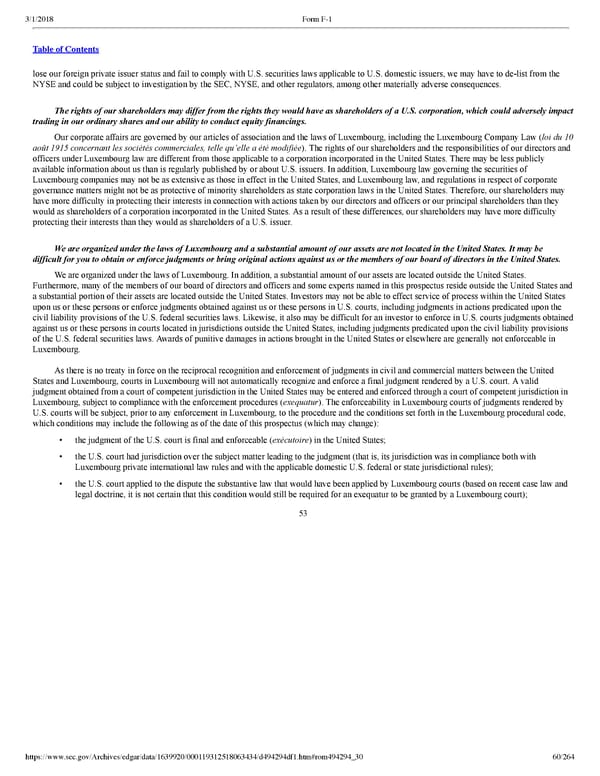60/264 lose our foreign private issuer status and fail to comply with U.S. securities laws applicable to U.S. domestic issuers, we may have to delist from the NYSE and could be subject to investigation by the SEC, NYSE, and other regulators, among other materially adverse consequences. The rights of our shareholders may differ from the rights they would have as shareholders of a U.S. corporation, which could adversely impact trading in our ordinary shares and our ability to conduct equity financings. Our corporate affairs are governed by our articles of association and the laws of Luxembourg, including the Luxembourg Company Law ( loi du 10 août 1915 concernant les sociétés commerciales, telle qu’elle a été modifiée ). The rights of our shareholders and the responsibilities of our directors and officers under Luxembourg law are different from those applicable to a corporation incorporated in the United States. There may be less publicly available information about us than is regularly published by or about U.S. issuers. In addition, Luxembourg law governing the securities of Luxembourg companies may not be as extensive as those in effect in the United States, and Luxembourg law, and regulations in respect of corporate governance matters might not be as protective of minority shareholders as state corporation laws in the United States. Therefore, our shareholders may have more difficulty in protecting their interests in connection with actions taken by our directors and officers or our principal shareholders than they would as shareholders of a corporation incorporated in the United States. As a result of these differences, our shareholders may have more difficulty protecting their interests than they would as shareholders of a U.S. issuer. We are organized under the laws of Luxembourg and a substantial amount of our assets are not located in the United States. It may be difficult for you to obtain or enforce judgments or bring original actions against us or the members of our board of directors in the United States. We are organized under the laws of Luxembourg. In addition, a substantial amount of our assets are located outside the United States. Furthermore, many of the members of our board of directors and officers and some experts named in this prospectus reside outside the United States and a substantial portion of their assets are located outside the United States. Investors may not be able to effect service of process within the United States upon us or these persons or enforce judgments obtained against us or these persons in U.S. courts, including judgments in actions predicated upon the civil liability provisions of the U.S. federal securities laws. Likewise, it also may be difficult for an investor to enforce in U.S. courts judgments obtained against us or these persons in courts located in jurisdictions outside the United States, including judgments predicated upon the civil liability provisions of the U.S. federal securities laws. Awards of punitive damages in actions brought in the United States or elsewhere are generally not enforceable in Luxembourg. As there is no treaty in force on the reciprocal recognition and enforcement of judgments in civil and commercial matters between the United States and Luxembourg, courts in Luxembourg will not automatically recognize and enforce a final judgment rendered by a U.S. court. A valid judgment obtained from a court of competent jurisdiction in the United States may be entered and enforced through a court of competent jurisdiction in Luxembourg, subject to compliance with the enforcement procedures ( exequatur ). The enforceability in Luxembourg courts of judgments rendered by U.S. courts will be subject, prior to any enforcement in Luxembourg, to the procedure and the conditions set forth in the Luxembourg procedural code, which conditions may include the following as of the date of this prospectus (which may change): • the judgment of the U.S. court is final and enforceable ( exécutoire ) in the United States; • the U.S. court had jurisdiction over the subject matter leading to the judgment (that is, its jurisdiction was in compliance both with Luxembourg private international law rules and with the applicable domestic U.S. federal or state jurisdictional rules); • the U.S. court applied to the dispute the substantive law that would have been applied by Luxembourg courts (based on recent case law and legal doctrine, it is not certain that this condition would still be required for an exequatur to be granted by a Luxembourg court); 53
 Spotify F1 | Interactive Prospectus Page 59 Page 61
Spotify F1 | Interactive Prospectus Page 59 Page 61